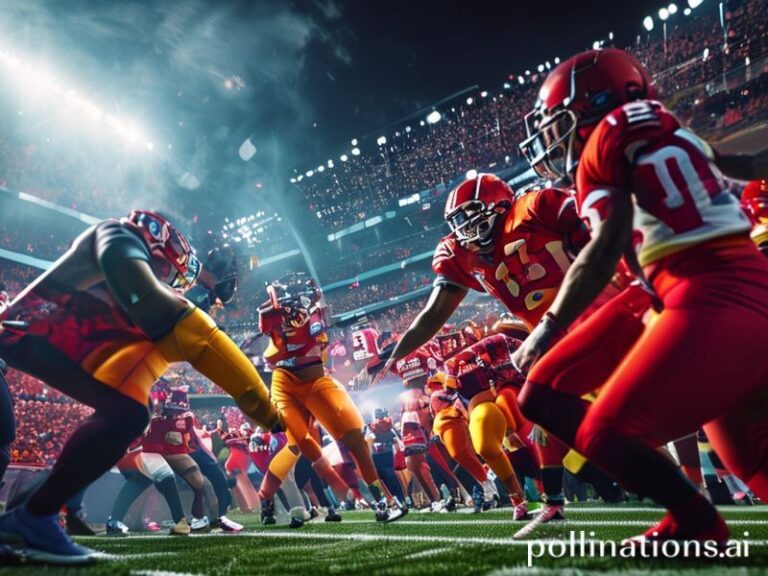Raheem Mostert’s Global Sprint: How One NFL Cast-off Became Capitalism’s Fastest Metaphor
Raheem Mostert and the Mirage of the American Dream, Observed from 34,000 Feet Above the Atlantic
By Dave’s Locker International Desk
Somewhere between Shannon and Reykjavik, the seat-back screen froze on a looping NFL highlight: Raheem Mostert slicing through the Cowboys’ defense like a tax lawyer through a loophole. The cabin lights dimmed, the flight attendants retreated to their jump seats, and I found myself marvelling that a man once discarded by six separate teams can still outrun entire economies. Welcome to the global parable of Mr. Mostert—sprinter, survivor, and accidental geopolitical metaphor.
To the uninitiated, Mostert’s story is the standard American fable: undrafted afterthought becomes record-setting playoff hero, complete with 220 rushing yards against Green Bay that made hardened Midwesterners weep into their cheese curds. But from a perch over the Mid-Atlantic Ridge, it looks less like feel-good Americana and more like late-stage capitalism doing cardio. Consider the numbers: Mostert has been waived or cut nine times—once for every G7 nation, if you’re scoring at home. Each pink slip was a reminder that in the NFL’s labor bazaar, human beings are tradable commodities, their hamstrings more valuable than their humanity. If that sounds bleak, remember the same logic governs global supply chains, only with less padding and more lithium.
Zoom out and the implications ripple like a concussion protocol. Broadcast rights for American football now reach 190 countries, where insomniacs from Lagos to Lahore watch men in colored armor negotiate turf like disputed archipelagos. When Mostert bursts through a gap, Shanghai crypto traders pause mid-leveraged bet; Kenyan marathoners glance up from their porridge and mutter, “Not bad for a sprinter.” The NFL, that muscular export of American soft power, sells the dream that velocity equals virtue—never mind the chronic traumatic encephalopathy waiting at the finish line. It’s imperialism with end zones.
Europe pretends to be above it all, of course. UEFA rolls its collective eyes at the “stop-start barbarism,” then quietly cashes the licensing checks for Sunday Ticket subscriptions in Berlin basements. Meanwhile, the Bundesliga’s own wage model looks suspiciously similar: import athletic labor from poorer regions, juice the numbers, discard when depreciation hits. Mostert’s journey from New Smyrna Beach to Super Bowl starter mirrors a Ghanaian winger’s route to Ajax—different accents, same spreadsheet. The only real distinction is that the NFL wraps its layoffs in corporate euphemisms like “roster optimization,” whereas European soccer still has the decency to call a tribunal a tribunal.
Down below on planet Earth, the pandemic taught every government that contingency plans are for suckers. Mostert already knew. He kept a duffel bag packed for the next unscheduled flight to Jacksonville, the way a Syrian coder keeps a charged power bank for the next border crossing. Resilience is the word we use when we don’t want to admit the system is rigged. His 4.32-second 40-yard dash is impressive, but the real miracle is that anyone still believes the stopwatch is impartial.
Which brings us to the cosmic punchline. In 2023, Mostert signed a modest two-year extension—barely enough to buy a studio flat in London, never mind a detached garage in San Jose. The same week, a Saudi sovereign-wealth fund offered Lionel Messi $400 million to pretend Riyadh is a footballing hub. One man runs like the rent is due; the other walks like it’s already paid by oil futures. The global economy in miniature, sponsored by Visa and existential dread.
As the plane descended into Keflavík, the screen rebooted with a tourism ad: “Iceland—powered by geothermal hope.” Somewhere in the cargo hold, Mostert’s highlight reel kept looping, a silent reminder that speed is relative, but exploitation is universal. We deplaned into an Arctic wind that felt suspiciously like the draft day after day after day.
So toast the man’s touchdowns if you must; just remember the receipts are printed in every currency that’s ever devalued a dream. And if you feel a chill, it’s not the air conditioning—it’s the breeze from all those revolving doors.







